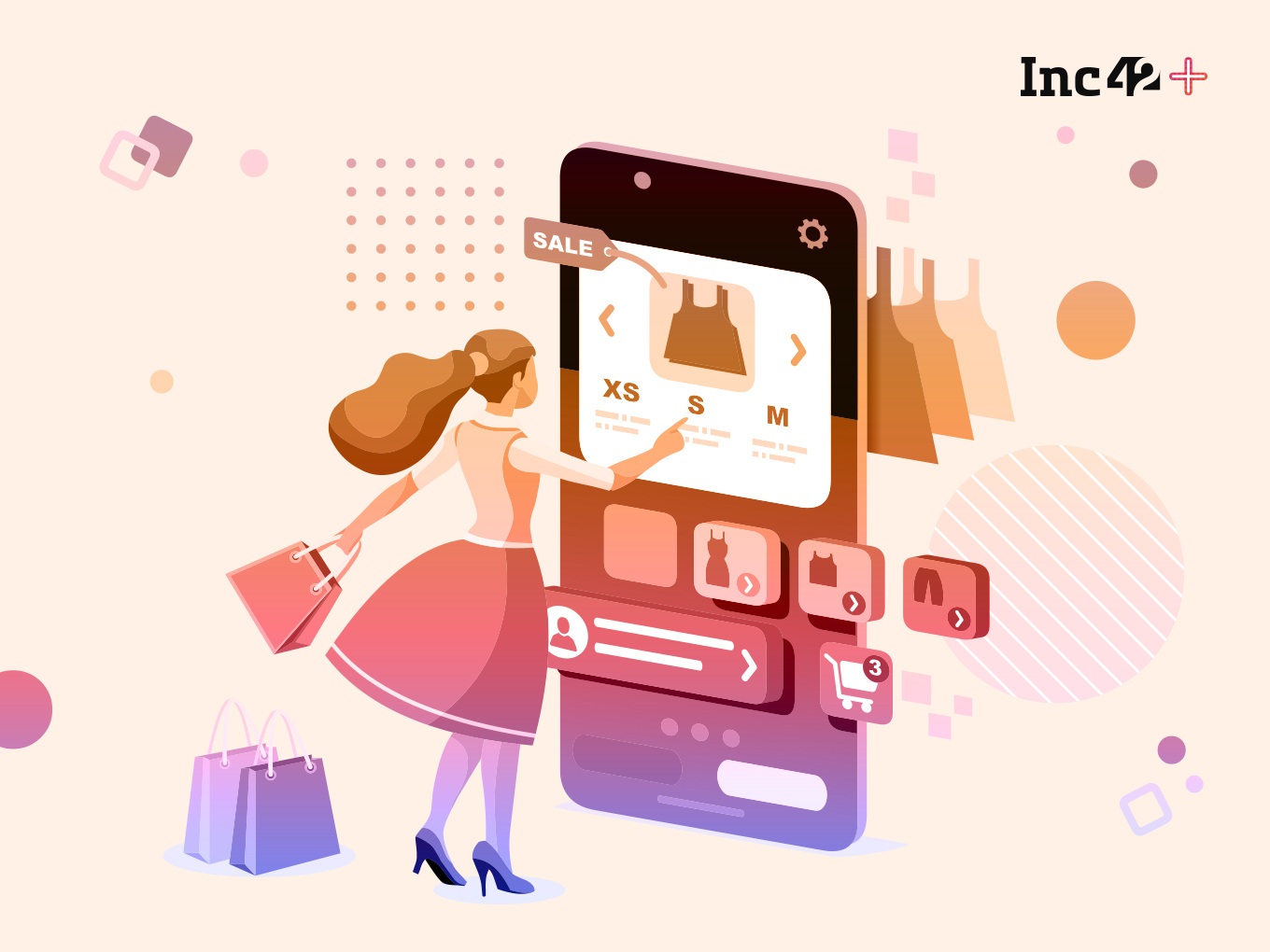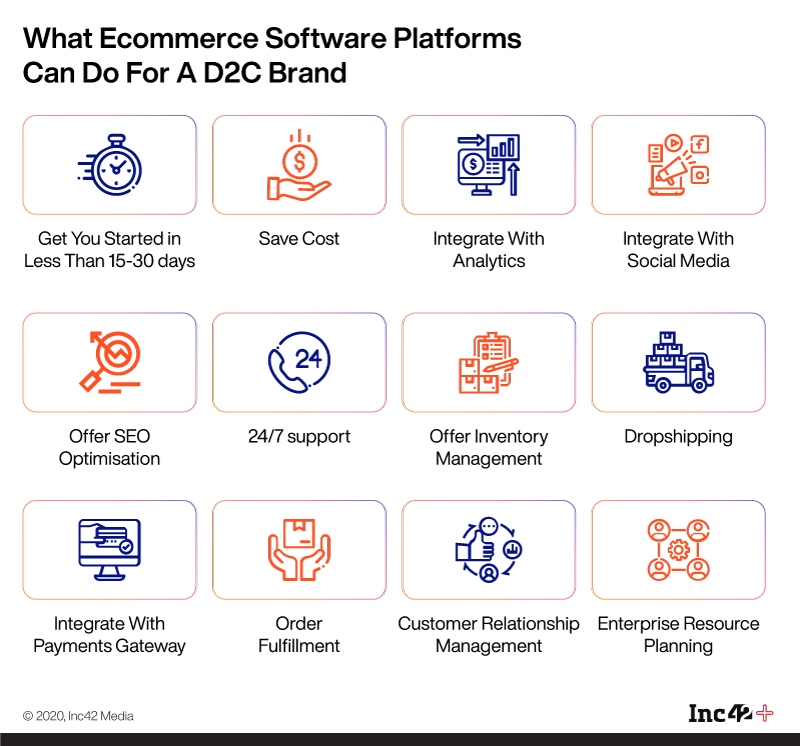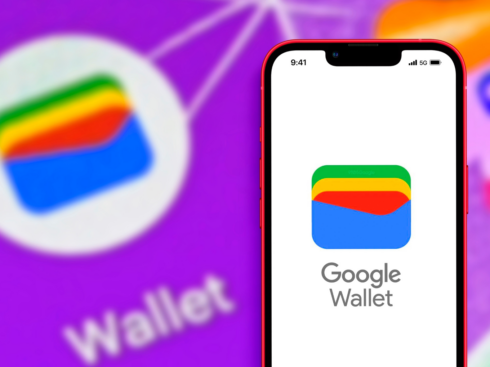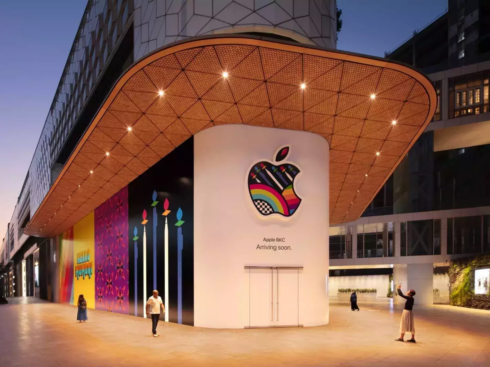SUMMARY
Setting up an online store today is a matter of weeks, thanks to a ready-to-use ecommerce software from Shopify, Magento, Ecwid, BigCommerce, Volusion, Wix and others
Multitudes of features such as customisable storefronts and cart analytics, multichannel sales, social media marketing hooks, shipping and delivery estimates, payment processing and payment gateway support have enabled the growth of D2C brands
Ecommerce software platforms have made a big mark in India where ecommerce acceptance is at an all-time high, but for brands looking to go the D2C way, pricing and subscription costs, integration with payment gateways, cloud computing and depth of analytics are the four crucial factors
India's D2C Rush
As more and more consumer brands go digital to reach customers faster and carve a unique identity, India’s direct-to-consumer (D2C) moment is well and truly here. With thousands of brands competing in the D2C space, will this be the future of India’s retail market?
The internet has brought people closer than ever before and even in the pandemic, real-time connections were the one thing that made many lonely days and nights less lonesome. In the Indian context, the explosion of digital communication has been an ongoing process since 2016 when Jio arrived on the scene. But the penetration of mobile internet did not immediately result in the adoption of online services. Well, not in the manner that most would have expected.
Up until a decade or more ago, the only way a small retail brand could reach a consumer was through super-markets or other retail outlets. This means a startup had to share margins with wholesalers, distributors and retailers so as to reach the hands of the consumers. Other than the popular but unorganised door-to-door selling of soaps, detergents, clothes, tea, and others from 1970 till 1990s, the direct relationship between the manufacturer and the consumer was almost non-existent and even when it did exist, it was more of a person-to-person relation than a brand-to-consumer. Thus, the ability to understand the target market and what consumers want was also significantly lower than what is possible digitally.
Today, with the internet turning into a household commodity, we have seen the emergence of direct to consumer (D2C) brands and as a commerce model in the consumer arena. Homegrown players like Ustraa, Mama Earth, Sunday, Sleepycat, Bombay Shirt Company, Bewakoof, Wakefit and Licious have made a mark for themselves. Post-Covid, the D2C model is seeing more takers and is being looked at as the future of Indian retail, especially when the consumer is getting more and more comfortable with shopping and exploring online.
Entry Barriers Razed
Innovative and personalised marketing, discounts and quick delivery are the critical factors that drive the ecommerce industry today and that’s exactly what D2C brands are riding on. In particular, food brands have tied up with high-visibility online grocery apps such as Bigbasket or even hyperlocal players such as Dunzo to extend their reach.
“The larger players such as Amazon, Flipkart have gone on to setup a very robust ecosystem that enables them to provide best in class services from delivery promise, customer service, returns etc, and have now set a very high expectation for any other D2C business to live up to that level of service,” said Ameve Sharma, cofounder and managing director of healthcare and personal care brand Kapiva Ayurveda.
However, a decade ago, when India was still new to ecommerce, setting up an online store meant a huge IT team working for months to create a seamless experience. Today, it is a matter of weeks or even days and anyone can do it, thanks to a ready-to-use ecommerce software offered by the likes of Shopify, Magento, Ecwid, BigCommerce, Volusion, Wix Stores and many others.
With an average Indian today spending more than one and a half hours on digital platforms today, which is predicted to cross three hours by 2022, this seems the right time for brands to go the D2C way. For many, this was the only choice when offline businesses came to a close. And, the rise of ecommerce platforms like BigCommerce and Shopify made it simple for them to move online quickly.
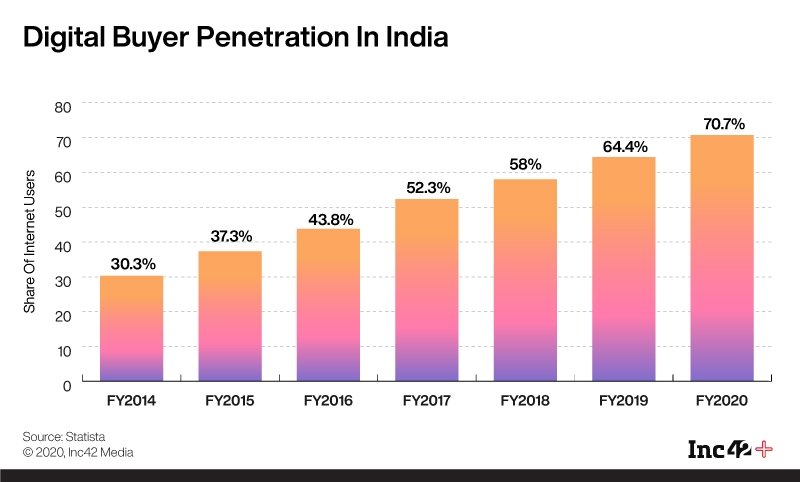
“On March 17, we closed our retail locations. We didn’t have an ecommerce platform and started to go into panic mode. As we were putting our heads together, @groovecommerce emailed us to say they were there for us. They built and launched a BigCommerce store for us in just 10 days – it was the saving grace we needed. By early the following week, we had a ton of orders coming through!”, apparel brand Sara Campbell Ltd shared on Instagram.
In India, there have been many similar experiences. Inchmasala, a chai brand that was supposed to launch a D2C channel in December 2019, got stuck due to the pandemic. A month ago, however, they went ahead and launched an ecommerce website in a matter of 15 days by choosing Shopify. “Shopify is an easy to use platform and a lot of friends recommended the same. They also offer modules on what you can do towards marketing etc,” said Apporwa Choudhary, cofounder, Inchmasala, a brand that started its D2C store on Shopify.
Naturally, India is also a growing market for many of these platforms.
“We have localised our product in a number of ways. We offer pricing and plans in Indian Rupees, and we give business owners in India the ability to accept payments online with local payment processors. We also offer our product in Hindi,” Nir Zohar, president & COO, Wix told Inc42, while talking about the Indian market.
Wix has seen a huge spike in users signing up during the pandemic, globally. Some categories within 500K businesses using it registered over 780% YOY growth in April and May 2020 as compared to 2019.
Adding D2C Brands To The Cart
Ecommerce enablers and software makers have looked to woo the new wave of digital businesses with special offers. Online shopping has entered a stage of hyper-growth, and businesses need the resources to meet this increasing demand.
For instance, Shopify is currently extending many offers from partners across categories. Over INR 1 Lakh in partner credits can be saved with these offers from leading technology, solution and service partners such as Razorpay, Paytm, Shiprocket, Adyogi and Delhivery to name a few, claims the company.
“The lockdown has impacted the way we do commerce and retailers are moving online, quickly. Brands now want a scalable agile platform wherein they can launch their stores within a short span of time. They are actively looking for platforms that offer growth, support automation tools, innovative customer engagement tools and lower running costs,” Anuroop Krishnan, Head of Marketing at Shopify India told us.
Some of WooCommerce’s consulting partners called WooExperts have also been offering Covid-19 relief. For instance, one of its partners, Bright Vessel, has reduced the hourly rate from $120 to $90 and 20% discount on maintenance plans.
Wix recently introduced new ecommerce solution that provides merchants, entrepreneurs and retail brands of all sizes features such as customisable branded storefronts and carts, multi-channel sales, dropshipping, native payment processing with Wix Payments, professional analytics and report creation, extensive shipping and fulfillment capabilities, and more.
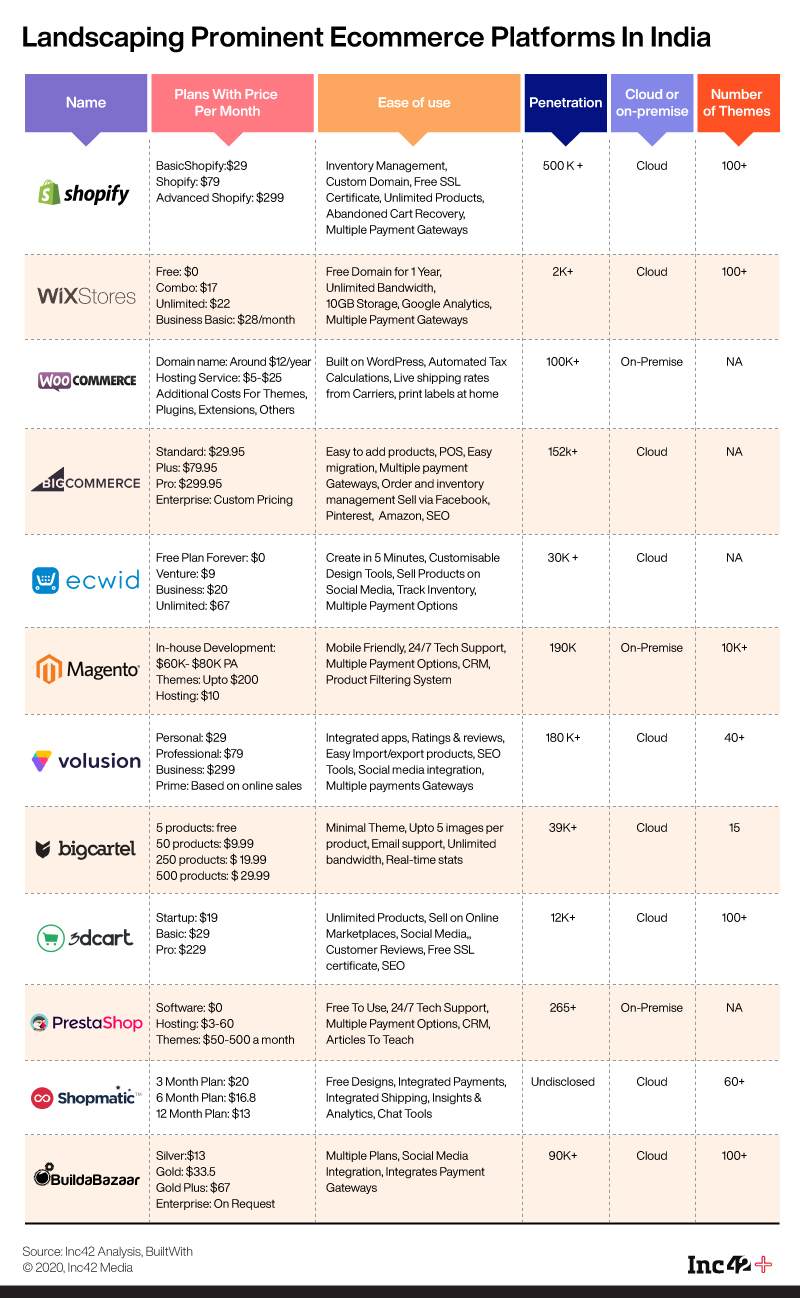
While these offers have come in handy, with more than 100 different shopping cart software platforms available today promising almost similar features, it is still tricky to choose the right platform for one’s brand as they begin their online journey. Through this article, we will help you understand the features and benefits these software platforms offer and how to go for the right one.
Shopify claims it supports around 500K businesses in 175 countries. In India it was launched in 2014 and has been supporting many popular brands such as Bajaao, boAt, Wear Your Opinion, Mcaffeine, The Man Company, Wow Skin Science, Blue Tokai, PeeSafe among others.
What Works In The Indian Market
For D2C brands, Shopify is possibly the go-to option given how well the company has positioned itself in the market and its large presence. After the pandemic, the Ottawa-headquartered company has also come up with exclusive offers to help small and medium businesses across India adjust to the new normal and sell online more efficiently.
“It offers SEO, best branding practices and more. Additionally, unlike many platforms that offer yearly subscription, Shopify offers monthly subscription, which is very important for us,” added Choudhary of Inchmasala.
But others have found a different fit for their businesses. For Melorra, a Bengaluru-based startup that has no retail presence, Magento as a backend platform solves the problems of scale and automating business processes. The startup launched in 2019, today delivers to over 1,500 towns and gives the credit to its success to its D2C model backed by tech.
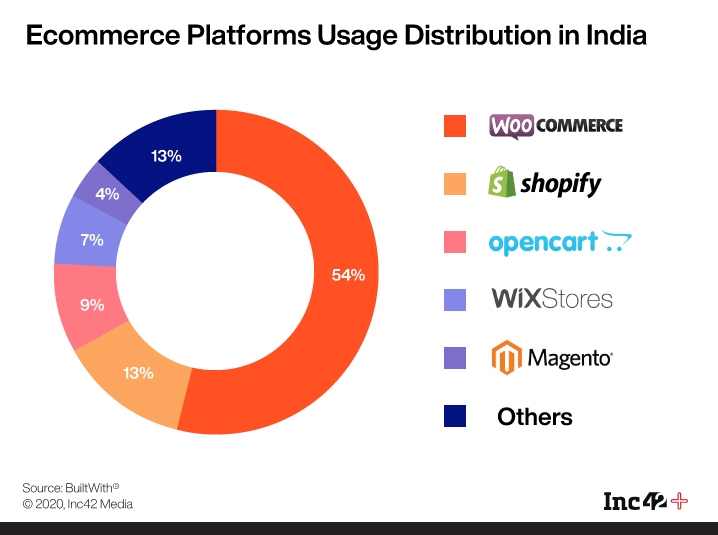
“The model helps us bring in a great deal of efficiency. We can run processes in a more lean and productive manner and deliver to customers all over India. As a D2C brand, we are able to maintain complete control over the entire consumer experience online. This has enabled us to launch our collections at the fastest rate in the market and make our operations highly cost-effective,” Saroja Yeramilli, CEO and founder, Melorra told us.
The Price Matters
As usual, pricing, which is uniform across countries, plays a key role in businesses deciding which ecommerce cart software to use. The likes of Big Cartel, which was founded in 2005 and helps independent artists and small brands open a store and US-based Ecwid offer free services with limitations on the number of products supported.
For companies ready to shell out a little more money, there are different tiers offered as well. For instance, Shopify has Basic Shopify with a monthly charge of $29, Shopify for $79 and Advanced Shopify for $299 per month. The advanced one has few additional features including third-party calculated shipping rates, which means it will show calculated rates for native checkout and third-party apps. With the advanced plan startups and brands also get a report builder to build on their sales analysis. The main difference comes in staff accounts, file storage, bandwidth, support such as 24/7 live chat, online store website, blog module and point of sale.
Newer D2C brands and those coming online need to be aware that many platforms may also require them to employ a team to manage the store, which adds to the cost.
“Magento and Bigcommerce are complicated platforms and hence are expensive to maintain. You need to have an in-house team of developers if you are using any of these platforms,” Tamiesh Sood, founder, T.A.M. Collective, a startup accelerator that helps D2C brands scale up, told Inc42.
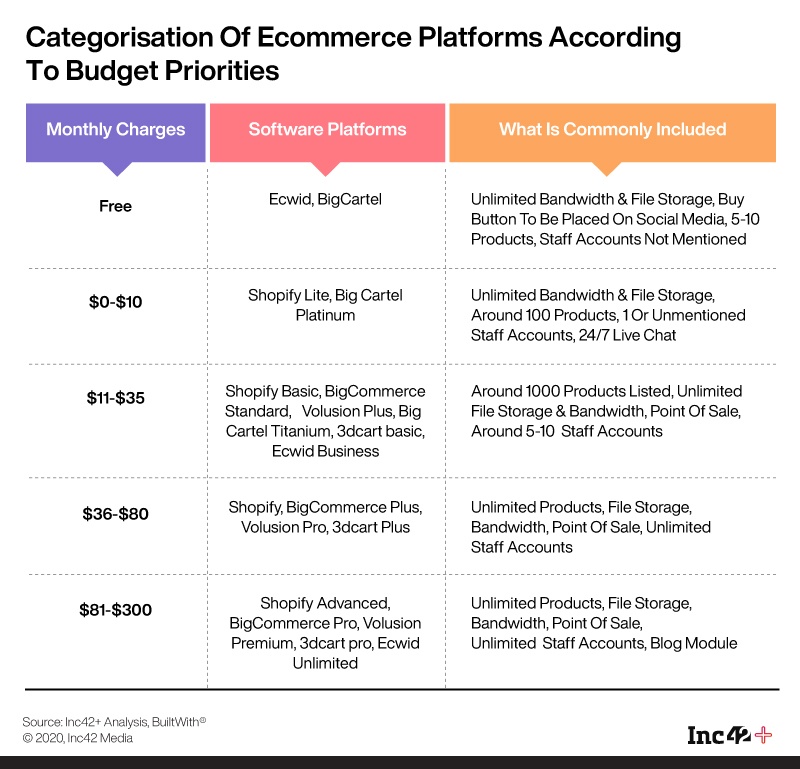
The Payments Conundrum
The next step is understanding the various payment gateways that form a crucial link in the D2C value chain. Failed payments can result in customers getting turned off the brand and looking for ecommerce alternatives. This is a major weak point for many new brands. A payment gateway transfers information between a payment portal and the receiving bank. Depending on the target group, one should decide the right payment gateways and the platform that has integration with the same. For instance, in the US, PayPal and Venmo are the preferred modes.
Not having the correct payment gateway, which accommodates multiple payment options, can easily lose many customers, especially if one’s brand is in the non-essential category. Around 70% of online shoppers in the US who have the intention of buying abandon during the checkout process. One of the reasons for the same is lack of enough payment methods.
Shopify has more than 100 payment providers from across the globe, while WooCommerce is supported by WordPress, it also easily integrates many third-party payment processors. However, these may not be the most affordable for new brands and that’s where the decision-making will play a role. Most platforms charge an average of 1.75% to 2.5% per transaction, which also needs to be accounted for when scaling up. And that’s on top of the fixed cost.
Security is also something that should be on top of the mind to gain trust and retain customers. Experts say choosing SSL encryption and safety features increase trust since online payment gateways process financial information. Most platforms would enforce SSL encryption for brands.
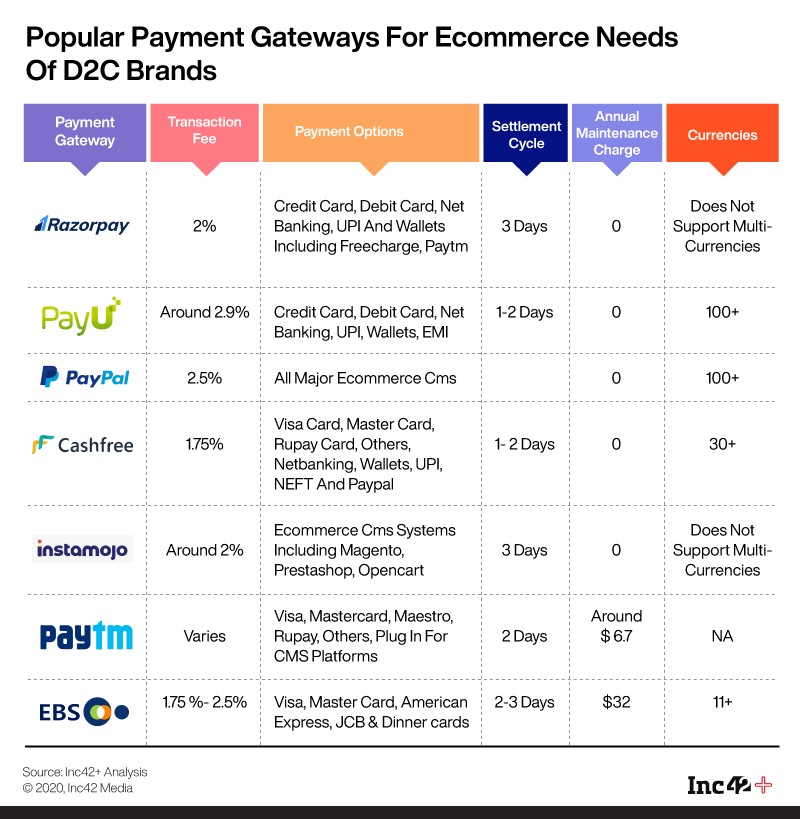
The Cloud Factor
Most ecommerce software such as those made by Bigcommerce, PrestaShop, Shopify, 3dcart and others are SaaS or cloud-based platforms. They host and manage the software to help businesses sell products online, along with managing the website, marketing, sales, and others at ease. Then there are open-source on-premise platforms such as WooCommerce, Magento, Drupal, which are installed locally on the company’s hardware and one needs to use their own hosting and manage the data on their own.
Cloud-based platforms typically offer a simple interface such as any system management software that enables everything a retail brand would need to run an online site. Most platforms integrate the software with other platforms and services such as customer relationship management (CRM), catalog management system (CMS), enterprise resource planning (ERP), payment gateways, email marketing tools, accounting software, fulfillment services, social media networks and more. The store can be managed by anyone from a non-tech background as well. Essentially, with a cloud-based subscription model, the brand does not have to buy any additional infrastructure and the cloud provider maintains servers, network and everything else. But this is typically expensive in the short-term and the cost evens out as the brand scales up.
While an on-premise setup is considered more reliable, since it provides more control, it does require additional resources and a long-term solution when scaling up the platform. It involves a lot of cost in terms of training and support and building up a team to manage this. One has to constantly update the software and servers and this usually is not fit for agile operations. It not only has a lot of initial investment, one may have to shell out money regularly to maintain and operate. The resources are deployed in house, on its premise, unlike in the cloud environment where it is hosted on the service provider.
While for larger companies that have more data and increased concern over privacy, this could be a better choice, for startups, cloud seems to be the natural choice as they can avoid the big long-term cost. For those with a well-defined long-term strategy and enough capital to spend on resources, on-premise could give more security and also may turn out to be cheaper in the long-term as they will not be charged for every order.
The Tech And The Product
Besides the support from ecommerce software platforms, Facebook, Google, Instagram and others have been key enablers of D2C success by helping bring some of the smaller brands online and giving them more visibility. The robust infrastructure provided by them has helped D2C companies scale up and get familiar with digital marketing. The big tech companies have helped brands with increased access to consumer data and better control over narrative by offering multiple cost-effective channels such as social, video, email and SEO.
Social media ads, influencer marketing, better presence on Google search results and other factors have kickstarted the D2C wave. These brands use tech to ditch the traditional distribution models and forge direct long-term relationships with consumers.
And finally, D2C brands need to see how ecommerce enablers and cart software can actually fit into their business.
The question of analytics and integration with Google Analytics is a big one that brands need to answer. This will be the bread and butter of sales — the basics on which the sales funnel can be built. There are other aspects to consider as well. Does the platform allow you to sell directly to consumers on Facebook, eBay, Amazon, and Pinterest, without managing separate inventories? How customisable is it? What third-party apps and software does it support and how many products can one list?
“Limitation on number of products, transaction fee, inventory management, starting a blog, shipping options, integrations with additional applications, built with open APIs, drop-down menus and an editor are also some of the factors that one should look at. The best and easiest thing to do is to go for a free trial, offered by almost every platform,” said Harpreet Munjal, founder Of LoudGrowth, a digital marketing services & SEO Agency.
Overall, different ecommerce platforms work for different brands depending on various reasons such as scale, category, budget, and others, but with D2C driving the second wave of ecommerce, it is surely a win-win for most brands and ecommerce software platforms alike. The rise of D2C brands has led to a rise in third-party ecommerce software companies and vice-versa.



